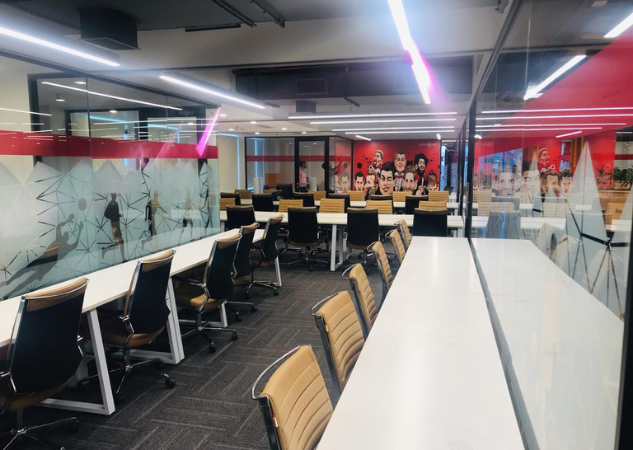Cyber threats are an everyday challenge for businesses, especially in a world that depends on digital systems. From ransomware attacks to data breaches, these threats can disrupt operations, compromise sensitive information, and damage your reputation. However, taking proactive steps can minimize risks and ensure your business stays secure. Here’s a detailed guide to improving cybersecurity for businesses with practical steps and IT security solutions for small businesses.
💡 Are you looking for Coworking space in Gurgaon, Noida or Delhi? We are just a call away.
Call Now: 08999 828282
12 Best Steps to Make Sure Your Business Can Handle Cyber Threats
- Educate Your Team
- Use Strong Passwords
- Enable Two-Factor Authentication (2FA)
- Install Antivirus Software
- Update Software Regularly
- Use a Firewall
- Secure Your Wi-Fi Network
- Back Up Your Data
- Invest in IT Security Solutions
- Create an Incident Response Plan
- Limit Data Access
- Work with Cybersecurity Experts

1. Educate Your Team
Cybersecurity starts with people. Your employees should be your first line of defense. Organize regular training sessions to teach them about common threats like phishing emails, fake websites, and malware. They should know how to spot unusual activity, report suspicious incidents, and avoid risky online behavior. Consider using online courses or bringing in experts to make the training interactive and relevant.
2. Use Strong Passwords
Weak passwords are one of the most common entry points for hackers. Encourage employees to create complex passwords with a mix of letters, numbers, and symbols. Avoid reusing passwords across accounts. Implement password policies, like requiring updates every few months. Using a password manager can simplify this process by securely generating and storing strong passwords for all employees.
3. Enable Two-Factor Authentication (2FA)
Two-factor authentication adds a second layer of security. Even if hackers steal a password, they won’t be able to access your systems without a secondary verification method, such as a code sent to a phone or email. Most modern applications and services offer 2FA, and enabling it is a quick but powerful upgrade to your security.
Also Read: AI-Powered Cyberattacks: How SMEs Can Prepare And Defend
4. Install Antivirus Software
Antivirus software is essential for detecting and removing malicious programs like viruses, ransomware, and spyware. Choose software that provides real-time protection and regularly updates its database to recognize the latest threats. Encourage your employees to keep their antivirus software active and not ignore alerts or notifications.
5. Update Software Regularly
Outdated software often contains security vulnerabilities that hackers can exploit. Make sure all your business software, including operating systems, browsers, and third-party applications, is up-to-date. Enable automatic updates whenever possible. Regular patching closes gaps and strengthens your defenses.
6. Use a Firewall
Firewalls serve as a protective shield, blocking unauthorized access to your network. They filter incoming and outgoing traffic based on the security rules you define. Many small businesses use hardware or software firewalls, or a combination of both, to safeguard their systems. Ensure your firewall settings are configured correctly and monitored for any suspicious activity.
Also Read: How Data And AI Are Reshaping Contemporary HR Practices?
7. Secure Your Wi-Fi Network
Unsecured Wi-Fi networks are an easy target for cybercriminals. Use a strong password and change it periodically. Disable guest access or create a separate network for visitors. Implement encryption protocols like WPA3 for added protection. For remote employees, encourage the use of VPNs to ensure secure internet connections.
8. Back Up Your Data
Data loss from cyberattacks, like ransomware, can cripple your business. Regularly back up all critical data, including customer records, financial documents, and operational files. Store backups in a secure location, such as cloud storage with encryption or external drives kept offline. Schedule automated backups to ensure no important files are missed.
9. Invest in IT Security Solutions
Small businesses often lack the resources to build advanced cybersecurity systems internally. This is where IT security solutions for small businesses come in handy. Managed security services, endpoint protection software, and secure email gateways are affordable options tailored to smaller operations. These tools offer professional monitoring, malware detection, and other features to keep your business safe.
💡 Are you looking for Coworking space in Gurgaon, Noida or Delhi? We are just a call away.
Call Now: 08999 828282
10. Create an Incident Response Plan
No business is immune to cyberattacks, so it’s essential to have a plan in place for when something goes wrong. An incident response plan outlines the steps to take during and after an attack, including containing the breach, notifying stakeholders, and recovering data. Assign roles and responsibilities to your team and rehearse the plan regularly to ensure everyone knows what to do.
11. Limit Data Access
Not all employees need access to all business data. Restrict access based on job roles to minimize the risk of internal breaches or accidental exposure. Use role-based access controls to define who can view, edit, or share certain files. This also helps you identify the source of any data leak quickly.
12. Work with Cybersecurity Experts
If your business lacks in-house expertise, partnering with cybersecurity professionals can be a game-changer. These experts conduct audits to identify vulnerabilities, recommend solutions, and implement security protocols tailored to your business. Consider working with a managed security service provider (MSSP) for ongoing support and monitoring.
ensuring your business can effectively handle cyber threats requires a proactive approach that combines robust security measures, employee training, and a culture of vigilance. By prioritizing cybersecurity, you not only protect your valuable data but also build trust with your clients and stakeholders. As you fortify your defenses, consider the dynamic workspace solutions offered by The Office Pass (TOP), where modern amenities and collaborative environments foster productivity and innovation. Equip your team with the tools they need to thrive in a secure and supportive setting. Remember, a well-prepared business is one that can navigate the challenges of the digital age with confidence! Call to contact TOP at 08999 828282.
FREQUENTLY ASKED QUESTIONS (FAQS):
Question: What is cybersecurity for businesses, and why is it important?
Answer: Cybersecurity for businesses refers to practices and technologies designed to protect company data, systems, and networks from cyber threats like hacking, malware, and phishing. It’s crucial for safeguarding sensitive information, maintaining customer trust, and avoiding financial losses.
Question: What are the top cybersecurity threats faced by small businesses?
Answer: Small businesses often face threats such as phishing attacks, ransomware, data breaches, and insider threats. These risks can exploit vulnerabilities in IT security solutions if not regularly updated and monitored.
Question: How can small businesses implement effective IT security solutions?
Answer: Small businesses can start by installing firewalls, antivirus software, and intrusion detection systems. They should also educate employees about cybersecurity, use strong passwords, and regularly update software.
Question: Are there affordable cybersecurity options for small businesses?
Answer: Yes, many affordable IT security solutions for small businesses include cloud-based security services, free or low-cost antivirus software, and managed security services. These options provide robust protection without requiring a large budget.
Question: How can businesses ensure their employees follow cybersecurity protocols?
Answer: Regular training sessions on cybersecurity best practices, clear IT policies, and using tools like password managers can help employees adhere to protocols and reduce human errors that lead to breaches.
Question: What role does data backup play in cybersecurity for businesses?
Answer: Data backups are essential for recovering information after a cyberattack or system failure. Businesses should implement regular, automated backups and store them securely, either in the cloud or offline.
Question: How do cybersecurity threats differ for small businesses compared to large enterprises?
Answer: Small businesses often have fewer resources for cybersecurity, making them attractive targets for hackers. However, tailored IT security solutions for small businesses can provide effective protection similar to larger organizations.
Question: How can small businesses detect and respond to cyber threats?
Answer: Small businesses can use monitoring tools and intrusion detection systems to spot unusual activity. Having an incident response plan in place ensures a quick and effective reaction to minimize damage.
Question: What compliance regulations should businesses consider for cybersecurity?
Answer: Businesses should be aware of regulations like GDPR, HIPAA, or PCI DSS, depending on their industry. These laws often require specific IT security measures to protect customer data.
Question: How often should businesses update their IT security solutions?
Answer: Businesses should update their IT security solutions regularly—ideally, as soon as updates are available. Regular updates patch vulnerabilities, ensuring your systems stay ahead of emerging threats.









